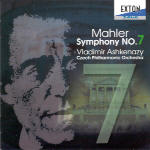The principal attraction of this Mahler Seventh for many may well be the playing of the Czech Philharmonic, which effortlessly sustains its reputation as one of the great Mahler ensembles. In fact, the orchestra premiered this very symphony way back when but only recorded it under Vaclav Neumann for Supraphon (one of the more peculiar efforts in what otherwise was a pretty good complete symphony cycle) and more recently (1998) under a similarly less-than-inspired Ken-Ichiro Kobayashi for Canyon Classics. Vladimir Ashkenazy’s bright, breezy performance will not please listeners who enjoy interpretations that ferret out every last aspect of the music’s strangeness. The first movement introduction, for example, completely lacks mystery, as does the similar passage preceding the recapitulation. But that’s not the whole story. The “moonlit” episode at the movement’s center seldom has sounded so lovely, with dynamics scrupulously observed, while the entire coda offers a classic example of how to balance a grand, Mahlerian peroration so that everything registers with maximum impact and clarity. The trumpets are thrilling here, as they are throughout the symphony.
Nachtmusik I also moves along smartly, and Ashkenazy’s refusal to indulge those evocative opening horn calls whenever they return once again deprives the music of some of its requisite atmosphere. The scherzo benefits from sensational playing by the strings and winds, but the timpanist clearly isn’t changing sticks as Mahler requires, and there’s none of the expressionistic quality that conductors as diverse as Scherchen, Gielen, and Bernstein reveal so consistently. Nachtmusik II sounds appropriately Romantic, as it almost always does, and thrives under flowing tempos that prevent the music’s perfumed sweetness from cloying. This movement was the principal liability in Neumann’s recording, taken as it was at a perversely slow speed.
Ashkenazy rips into the finale with gusto and plays it for maximum excitement, which works very well. Brilliant winds and brass, dead-accurate percussion, and superb rhythmic coordination carry the movement off effortlessly. So while the underplayed first three movements may prove disconcerting, there’s a lot to be said for an interpretation of this symphony in which the finale makes the best impression overall, and credit for this ultimately belongs to the conductor. Given his point of view, this is definitely the way to do it. Drop-dead gorgeous sound, a little bass-shy, adds considerable luster to the proceedings, though the engineers have captured a good bit of extraneous performance-related noise as well. An unconventional, not wholly convincing performance, then, but one that Mahlerians and Czech Philharmonic fans will probably want to hear nevertheless.
































